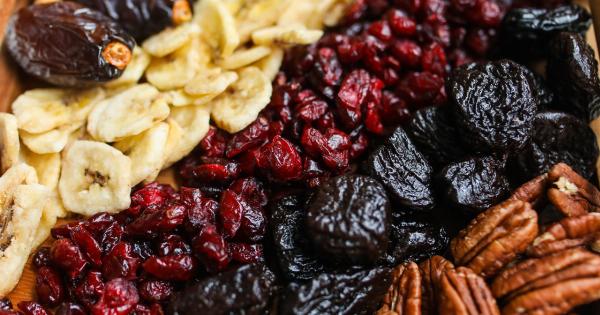Vitamin B is a crucial group of vitamins that play a vital role in maintaining our overall health and well-being. They are responsible for various bodily functions, including energy production, metabolism regulation, and proper cell function.
There are several different types of Vitamin B, each with its unique benefits and sources. In this article, we will explore the different sources of Vitamin B and why it is essential to include them in your diet.
1. Vitamin B1 (Thiamine)
Vitamin B1, also known as thiamine, is vital for converting carbohydrates into energy. It helps support brain function, maintain a healthy nervous system, and promote overall well-being. Excellent sources of Vitamin B1 include:.
- Whole grains (like barley, oats, and brown rice)
- Legumes (such as lentils and black beans)
- Pork
- Nuts and seeds (like sunflower seeds and flaxseeds)
- Yeast
2. Vitamin B2 (Riboflavin)
Vitamin B2, or riboflavin, is essential for energy production, skin health, and the production of red blood cells. Good sources of Vitamin B2 include:.
- Dairy products (like milk and yogurt)
- Eggs
- Lean meats (such as chicken and turkey)
- Leafy green vegetables (like spinach and kale)
- Almonds
3. Vitamin B3 (Niacin)
Vitamin B3, also known as niacin, is crucial for various bodily functions, including DNA repair, energy production, and cholesterol regulation. Some food sources rich in Vitamin B3 include:.
- Meat (such as beef and chicken)
- Fish (like tuna and salmon)
- Legumes
- Mushrooms
- Peanuts
4. Vitamin B5 (Pantothenic Acid)
Vitamin B5, or pantothenic acid, is necessary for synthesizing and metabolizing proteins, carbohydrates, and fats. It plays a vital role in energy production, hormone synthesis, and maintaining a healthy digestive system.
Some sources of Vitamin B5 include:.
- Avocado
- Lentils
- Chicken
- Broccoli
- Portobello mushrooms
5. Vitamin B6 (Pyridoxine)
Vitamin B6, or pyridoxine, is involved in over 150 enzyme reactions in the body. It plays a significant role in brain development and function, the synthesis of neurotransmitters, and maintaining a healthy immune system.
Good sources of Vitamin B6 include:.
- Fish (such as salmon and tuna)
- Poultry
- Potatoes
- Chickpeas
- Bananas
6. Vitamin B7 (Biotin)
Vitamin B7, also known as biotin, is necessary for healthy hair, skin, and nails. It is involved in the metabolism of carbohydrates, proteins, and fats. Some food sources rich in biotin include:.
- Egg yolks
- Organ meats (like liver)
- Nuts (such as almonds and walnuts)
- Seeds (like chia seeds and sunflower seeds)
- Sweet potatoes
7. Vitamin B9 (Folate/Folic Acid)
Vitamin B9, commonly referred to as folate or folic acid, is crucial for cell division and growth, DNA synthesis, and red and white blood cell production. It is especially important for pregnant women to prevent birth defects.
Excellent sources of Vitamin B9 include:.
- Leafy green vegetables (like spinach and romaine lettuce)
- Legumes
- Citrus fruits (such as oranges and grapefruits)
- Avocado
- Asparagus
8. Vitamin B12 (Cobalamin)
Vitamin B12 is crucial for the production of red blood cells, healthy nerve function, and DNA synthesis.
It is primarily found in animal-based foods, making it important for individuals following a vegan or vegetarian diet to ensure adequate intake through supplementation. Good sources of Vitamin B12 include:.
- Shellfish (such as clams and mussels)
- Beef
- Fish (like salmon and trout)
- Poultry
- Eggs
9. Vitamin B Complex
In addition to the individual Vitamin B types, there are also Vitamin B complex supplements available in the market.
These supplements contain a combination of various B vitamins, providing a comprehensive approach to maintaining vitamin balance in the body. They are beneficial for individuals who may have difficulties obtaining enough of each B vitamin from their diet alone.
10. Importance of Vitamin B
Vitamin B plays a critical role in our overall health and well-being. It supports our energy levels, brain function, metabolism, and various other bodily functions.
Adequate intake of Vitamin B is essential to prevent deficiencies and associated health issues. Incorporating a variety of Vitamin B sources in our diet can help ensure we meet our daily requirements.






























